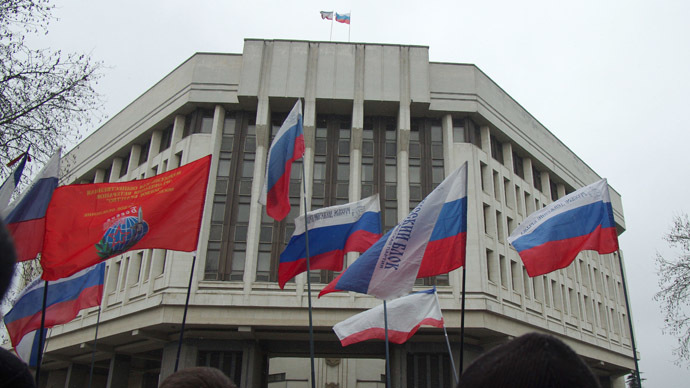The Crimean parliament and Sevastopol's city council have voted in favor of joining Russia. The decision will only come in force if it is approved by the Crimeans at a referendum which will be held in 10 days.
Crimean MPs voted on Thursday for the region to “to become part of the Russian Federation as its constituent territory,” says the text of the regional parliament’s statement.
78 MPs said yes to Crimea joining Russia, while 8 abstained from voting.
When the decision was announced to several thousand people waiting outside the parliament building, they, according to Itar-Tass, welcomed the news with cheers and screams of “Russia!”
The parliament has also made a decision to ask the Russian leadership to “launch the procedure of Crimea becoming part of Russia.”
Sevastopol’s city council also voted to become a subject of the Russian Federation and backed Crimea’s referendum. The city’s residents will take part in the March 16 referendum despite the city enjoying a special status and not officially being part of Crimea.
The speaker of the Crimean parliament, Vladimir Konstantinov, explained that the parliament’s decision on the region joining Russia still has to be approved at a referendum, which has been scheduled for March 16. That’s two weeks earlier than announced last week.
"We are not in a rush, but that’s what the current situation demands,” Konstantinov told Itar-Tass. ‘We are trying to address the sentiments currently shared by the population. Those are uncertainty and fear. We must give them confidence and offer a clear political way out of the crisis.”
There will be two questions on the Crimean referendum ballots.
“The first one: Are you in favor of Crimea becoming a constituent territory of the Russian Federation. The second one: Are you in favor of restoring Crimea’s 1992 constitution,” the autonomous region’s First Deputy-Premier Rustam Temirgaliev said.
According to the 1992 constitution, the autonomous republic is part of Ukraine but has relations with Kiev, defined on the basis of mutual agreements.
The variant which gets the simple majority will be the winner in the referendum.
PHOTO: #Crimea parliament resolution setting referendum on region's status for March 16 http://t.co/qSWbmMTYmipic.twitter.com/M6xOOhVyCe
— RT (@RT_com) March 6, 2014
Kiev has reacted by describing the referendum illegitimate.
"My position is that this referendum is unconstitutional," the coup-imposed Ukraine’s economy minister, Pavlo Sheremeta, said as cited by Reuters.
Acting Ukrainian President Oleksander Turchinov said authorities in Crimea region were “totally illegitimate, both the parliament and the government.”
"They are forced to work facing the barrel of a gun and all their decisions are dictated by fear and are illegal," Turchinov’s spokeswoman said.
Crimea’s authorities have meanwhile announced that they are ready to nationalize all Ukrainian state enterprises and introduce a ruble zone in the region in case the referendum decides in favor of joining Russia, according to Interfax.
PHOTO: Crimeans chant 'Glory to Russia' after parliament vote to join Russian Federation http://t.co/qSWbmMTYmipic.twitter.com/plk3eBMxNF
— RT (@RT_com) March 6, 2014
Russia’s State Duma (parliament) is ready to consider the possibility of Crimea joining Russia, according to the head of the Duma committee on the affairs of the Commonwealth of Independent States (CIS), Leonid Slutsky.
"The State Duma will consider any bills concerning this issue when the referendum has taken place and when the Russian leadership has made a decision on it,” Slutsky said as cited by RIA Novosti.
Meanwhile, the Crimean authorities said they were still negotiating a way out of the current crisis with the OSCE. The speaker of the Crimean parliament, Vladimir Konstantinov, said talks were under way and more were still to come.
Facts you need to know about Crimea and why it is in turmoil
More than half the Crimean population are Russian and use only this language for their communication.
Crimean authorities denounced the self-proclaimed government in Kiev and declared that all Ukrainian law enforcement and military deployed in the peninsula must take orders from them. The majority of troops in Crimea switched sides in favor of the local authorities.

